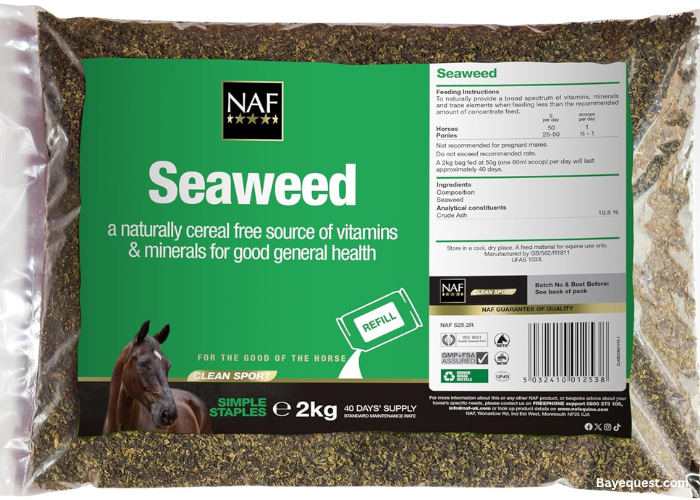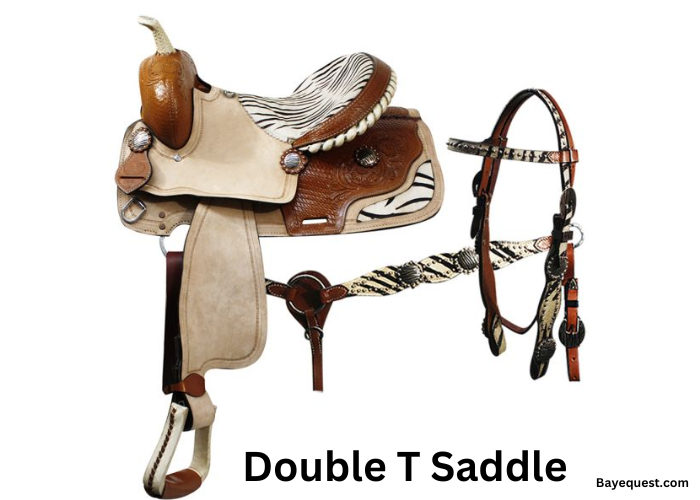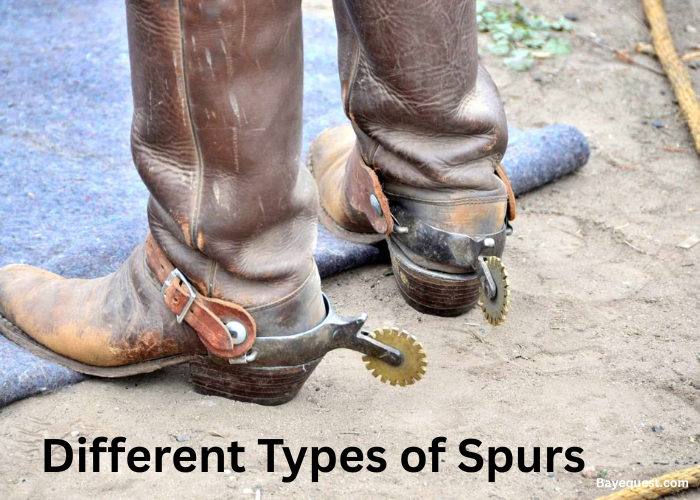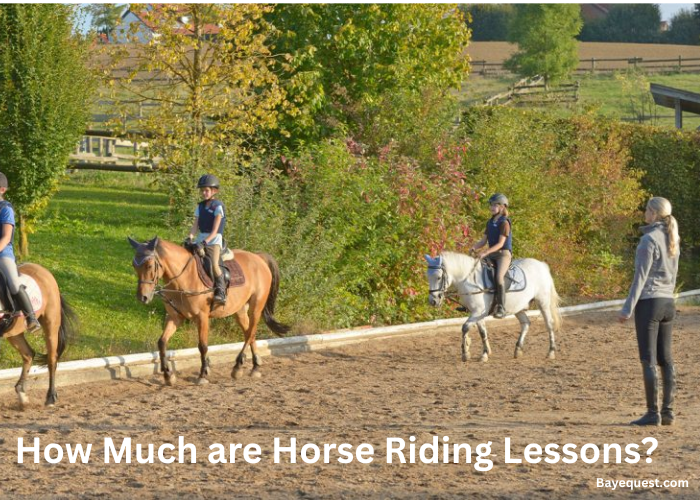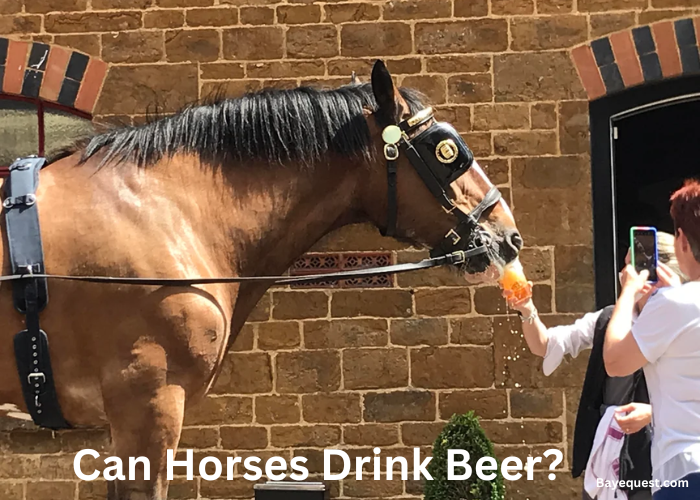As an equestrian, you’re always striving to meet your horse’s increasing dietary needs. A healthy horse diet consists of quality forage, whole grains, and concentrated supplements.
Unfortunately, forages and feed are often short on essential vitamins and minerals. Since proper nutrition is critical, fill dietary gaps using the best mineral supplements. They provide a natural source of nutrients, allowing your horse to thrive.
If you’re struggling to pick the best horse vitamin and mineral supplements, this guide is for you.
7 Best Horse Vitamin and Mineral Supplement: Key Takeaway
- Best Overall Horse Supplement- Equine America Turmeric Xtra 3KG
- Most Affordable Horse Supplement- Equivite Original Horse Supplements 3kg
- Best Supplement For Arthritic Horses: Equine America Glucosamine Premium Horse & Pony Supplement
- Best For Healthy Skin & Shiny Coat- AniForte Brewers Yeast Powder for Horses
- Best Supplement For Hoof Growth- NAF Biotin Plus Refill – High Strength Hoof Supplement for Horses
- Best For Breeding Horses- HORSE FLEX Natural Vitamin E Powder
- Best For Horses With Metabolism Issues: NAF Seaweed for Horses 2kg Refill
Top Recommended Horse Vitamin and Mineral Supplements
1. Best Overall Horse Supplement- Equine America Turmeric Xtra 3KG
This product from Equine America is for competitive horses involved in equestrian sports. It blends turmeric, calcium, and vitamin E to support mobility in horses and ponies.
Besides targeting joint muscles and cartilage, this item‘s ingredients detoxify the liver. It contains linseed oil and black pepper that hasten the absorption of curcumin.
Curcumin is the main active ingredient in Turmeric. Curcumin’s anti-inflammatory properties provide added immunity and digestive support.
The supplement also features essential oils that support respiratory health in horses. If your horse is exposed to pollen spores or dust, this product is handy to use.
It’s noteworthy that all ingredients are organic, providing a natural option to support horse health. Fortunately, Turmeric Xtra is fully balanced and arrives ready to use.
Also, it’s highly palatable and contains a full-fat linseed meal. This eliminates the need to add further linseed. Instead, you just add the supplement to your horse’s regular feed.
When fed as part of a balanced diet, this 3kg tub should keep your horse going for up to sixty days.
The dosage is simple. For a 500kg horse, feed 26g daily for the first week and 52g thereafter. Caution should be taken not to exceed 104g per day.
Pros
- It’s easy to use
- Product is well-packaged
- It includes a free bag of treats
- It’s effective and long-lasting
2. Most Affordable Horse Supplement- Equivite Original Horse Supplements 3kg
Seasoned equestrians understand the importance of providing a balanced horse diet throughout. This product allows you to meet your horse’s nutritional needs without overspending.
It contains essential nutrients, nourishing horses of all ages and activity levels. Its low-starch and low-sugar formula makes it ideal for overweight and laminitis-prone equines.
The multivitamin contains wheat, magnesium oxide, calcium carbonate, sucrose, and mono-dicalcium phosphate.
It also contains chelated copper, manganese, selenium, and zinc, which enhance nutrient absorption. This combination supports muscle function, immune health, bone strength, and coat condition.
Equivite is suitable for horses on forage-only diets or feeds that do not contain added vitamins. Since it’s in powdered form, you can blend it into regular horse feeds.
Most horses, even fussy eaters, readily accept this supplement without much ado. It comes in a 3kg tub, allowing for numerous servings.
While it doesn’t target specific conditions, such as hoof growth, it promotes general wellness. If you’re looking for a reliable supplement with genuine value, Equivite Original is a solid go-to.
Pros
- It’s affordable
- Great value for the price
- It’s great for fussy eaters
- It’s very palatable
3. Best Supplement For Arthritic Horses: Equine America Glucosamine Premium Horse & Pony Supplement
Joint health is a common concern for aging horses and those recovering from injury. Equine America is a dependable choice for maintaining joint health in arthritic horses.
It combines key nutrients to support joint lubrication, cartilage repair, and long-term mobility. Each dose contains pure glucosamine hydrochloride, which is essential for maintaining healthy cartilage.
This is fortified with hyaluronic acid, which maintains the viscosity of synovial fluid. This is the fluid that lubricates and cushions joints.
MSM, a natural source of sulfur, promotes connective tissue repair and flexibility. Together, these ingredients deliver nutritional support to reduce stiffness, promoting freer movement.
What gives this supplement an edge over other products is its simple formulation. It’s easy to feed and doesn’t include unnecessary fillers.
The powder is ready to use and mixes well with regular feed. Despite its high quality, this product is economical, with a 1kg tub lasting up to two months.
Dosage guidelines are also straightforward. For a 500kg horse, feed 30g daily for the first ten days and 15g afterwards.
If you’re training a high-performance athlete, consider supplementing with this joint recovery aid to help them recover from daily wear and tear.
Whether you’re aiding recovery or managing arthritis, this is the best product for joint care.
Pros
- Quality is great
- Good value for your money
- It’s effective and works as intended
4. Best For Healthy Skin & Shiny Coat- AniForte Brewers Yeast Powder for Horses
Improper nutrition can cause dry and lackluster coats in horses. Thankfully, this nutrient-rich product can restore skin vitality, promoting a healthy, glossy coat.
It contains excess B vitamins, including biotin, thiamine, and folic acid. These vitamins are essential for coat metabolism and skin health. They improve blood circulation to the hair follicles, delivering a vibrant coat color.
Besides grooming, biotin also promotes hoof health. As a result, you can use this dual-purpose product to support hoof care.
Another standout feature is the product’s additive-free formula. It utilizes pure brewers’ yeast instead of artificial fillers. This makes it suitable for long-term use with horses of all breeds and ages.
The supplement consists of 100% brewers’ yeast and is free from artificial additives. This makes it safe for long-term use and suitable for horses of all ages and breeds.
The product blends seamlessly into daily feed, and its natural flavor is palatable to even the pickiest eaters. Additionally, it’s backed by vets and animal health practitioners, guaranteeing visible results.
If you’re preparing for show season or looking for a nutritional boost, this supplement will enhance your horse’s aesthetics.
Use it to achieve a natural, healthy skin glow without relying on synthetic additives.
Pros
- It’s highly palatable
- It’s affordable
- Great value for your money
- It has a pleasant smell
5. Best Supplement For Hoof Growth- NAF Biotin Plus Refill – High Strength Hoof Supplement for Horses
If your farrier has bad news for your horse’s hooves, this product offers a proven solution. NAF Biotin Plus is formulated to promote hoof growth and improve horn strength.
Each dose contains 15 mg of biotin, a key nutrient essential for keratin production. This structural protein promotes hoof resilience, providing a protective barrier against the environment.
The supplement contains MSM, a natural source of sulfur that supports connective tissue health. Zinc is included to encourage healthy skin and hoof horn, ensuring a balanced approach to hoof care.
This composition makes the product ideal for horses with brittle or cracked hooves. Additionally, it’s recommended for ponies with flaky or slow-growing hooves.
The 2kg refill size offers an economical way to maintain your horse’s hoof health. Plus, it mixes well with regular feed, and its palatability ensures horses consume it.
For horses in heavy work or recovering from hoof issues, NAF Biotin provides the nutrients for stronger growth.
Since hooves take time to grow, don’t expect magical results. You’ll notice visible differences in hoof quality and strength within a few months.
Pros
- High-quality product
- It has a nice smell
- It delivers noticeable results
- It’s fairly priced
6. Best For Breeding Horses- HORSE FLEX Natural Vitamin E Powder
Horse Flex supplement contains essential nutrients to support muscle metabolism and fertility. It contains high-quality vitamin E and MSM to support muscle recovery and joint function.
Unlike with synthetic vitamin E, this product’s natural formula enhances absorption. So your horse gets more from every scoop.
The natural vitamin also eliminates waste products, such as lactic acid, that accumulate during pregnancy or exercise.
It’s valuable for young horses, breeding mares, and athletes with high nutritional requirements. Another standout feature is its clean formulation.
The product is free from artificial additives, fillers, sugars, and selenium. This vitamin supplement is also easy to administer, as it mixes well with regular feed. Just remember to moisten it so it doesn’t blow away.
Each daily dose delivers 2,457 IU of vitamin E, with clear dosing guidelines. Feed 4.25g to smaller horses and ponies under 350 kg, and 8.5g for larger horses.
This product comes in various sizes, including 270 grams, 540 grams, 810 grams, and 1620 grams packets. The sizes offer flexibility to supplement short-term or during the entire breeding season.
Pros
- It’s affordable
- It includes different pack sizes
- It’s palatable
- It consists of natural ingredients
7. Best For Horses With Metabolism Issues: NAF Seaweed for Horses 2kg Refill
NAF contains natural vitamins and minerals to enhance metabolic function in colic horses. Its iodine-rich formula regulates thyroid function, supporting healthy metabolism and weight management.
Besides metabolic support, this product promotes a glossy coat, healthy skin, and hooves. It’s also a valuable source of minerals, making it ideal for horses on strict or forage-only diets.
NAF is 100% natural and doesn’t include fillers, additives, or artificial preservatives. It’s also simple to administer and mixes well into the daily feed.
While horses readily accept it, introducing it gradually can help with fussier eaters. The supplement comes in a 2kg refill pack, ideal for restocking existing tubs. This feature also reduces packaging waste.
For horses sensitive to high-starch feeds, NAF Seaweed provides a safe way to balance their diet.
With this product, you don’t need to worry about metabolic disorders such as EMS or laminitis. This option delivers genuine nutritional value in a single, unprocessed form.
Pros
- Great value for money
- Packaging is great
- It tastes great
Understanding Horse Nutrition
A complete horse diet should encompass water, proteins, starch, fats, vitamins, and minerals. Horses primarily get these nutrients from forage and feed.
However, the balance is delicate, and you may need to supplement the diet with vitamins. Fats and carbohydrates provide energy, while proteins promote muscle growth and repair.
Similarly, vitamins and minerals play a crucial role in bone formation, enzyme activity, and nerve function.
Trace minerals such as zinc, copper, and selenium are also essential, but in small amounts. A diet that’s deficient in vitamins and minerals can cause performance issues in horses.
Additionally, your equine partner risks developing brittle hooves, dull coats, and lameness.
Popular Horse Vitamins and Mineral Supplements
Here are some popular supplements for horses
Joint supplements
If your horse suffers from osteoarthritis, pick the Equine America Glucosamine Supplement. This product can help manage stiffness or arthritis in aging horses.
It guarantees noticeable improvements within 30 days of use. Similarly, younger, active horses may require hip and joint supplements for additional protection.
Joint supplements often contain glucosamine, hyaluronic acid, and chondroitin sulfate (also known as ester C) to support mobility. Ingredients for joint care include MSM, yucca, ASU, silica, collagen, and vitamin C.
Digestive health supplements
While colic is a common horse condition, it’s often painful, affecting their wellbeing. Fortunately, you can easily alleviate this symptom by reducing stress and increasing turnout.
However, in the case of severe abdominal pain, use supplements that contain probiotics and prebiotics.
Most formulas contain oligosaccharides and yeast cultures that promote a healthy gut microbiome. They also improve digestion and nutrient absorption.
Skin and coat supplements
If your horse has a dull and faded coat, supplement its diet with AniForte Brewers Yeast Powder. This supplement contains essential nutrients that support a glossy coat and healthy skin.
It contains fat, so you can use it in conjunction with other weight-building supplements. Most coat supplements consist of flaxseed, rice bran, soybeans, chia seeds, zinc, amino acids, yeast, and biotin.
Hoof care supplements
Your horse’s hoof health determines the quality of life it leads. Dietary deficiencies can result in brittle, shelly feet that often nick or crack. This increases the likelihood that your horse will lose its shoes.
Thankfully, with NAF Biotin Supplement for Horses, the hooves will chip less often. The only catch is that hoof care supplements require long-term use.
Typically, they require 6-12 months of frequent use before noticing any improvement. While ingredients vary, most products contain lysine, MSM, fatty acids, and threonine.
They also include methionine, biotin, zinc, and copper. These nutrients reduce flaking during intense work in dry conditions.
Weight Gain supplements
Some horses are hard keepers and will struggle to gain or maintain weight. This is common even with sufficient high-quality forage.
In this case, a weight-building supplement can be a lifesaver. These supplements contain a high fat content with concentrated calories, making them suitable for weight gain.
Typical weight gain ingredients include amino acids, flax, rice bran, and vegetable fat.
Supplements for seniors
Horses can lead a productive life well into their 20s and 30s. Their long lifespan creates the need for a supplement formulated for aging horses.
These products promote joint & digestive health, weight management, and a strong immune system.
For senior horses, use only products from reputable manufacturers. Check for approval by the National Animal Supplement Council.
If it’s approved, it means the active ingredients are correctly listed. Additionally, the ingredients shouldn’t overlap with other supplements fed to your horse.
When to Consider Vitamin and Mineral Supplements for Your Horse
Here’s when to use horse vitamin and mineral supplements;
Recovery after illness
Equines recovering from surgery or illness require a nourishing diet. The nutrients help to fight infections and inflammation.
Similarly, the medication can impact metabolism or increase the need for specific nutrients. For example, vitamins, which are essential for healing and recovery, are depleted more quickly during illness.
Additionally, energy and protein requirements increase, making supplements crucial for recovery.
Aging horses
Older horses often experience digestive inefficiencies, leading to reduced nutrient absorption. Despite reduced workload, the horse still requires a proper diet.
This is essential to meet their nutritional and metabolic needs. For aging horses, use antioxidant supplements rich in selenium and vitamin C.
Horses on low-intake or poor-quality diets
A diet’s nutritional quality depends on its total nutrient content. This includes micronutrients, such as vitamins and minerals, and macronutrients, such as proteins and carbohydrates.
While it’s tempting to use a cheaper, low-quality diet, your horse will face nutritional gaps. Likewise, overweight horses on low-intake diets are also prone to vitamin deficiencies.
To address this, use supplements that enhance the absorption of minerals and amino acids.
Horses on forage-only diets
While forage and straight grains are common horse feeds, they lack key minerals and vitamins. This imbalance poses problems for performance and breeding horses with higher nutritional demands.
Subsequently, supplementing their diet with these nutrients is essential for their well-being.
Breeding horses
Breeding mares and working stallions require more vitamins, minerals, and amino acids. These micronutrients are critical for their growth and development.
Failure to provide adequate nutrients to your breeding stock can cause irreversible damage. So, ensure that you meet all the nutritional needs of pregnant mares and young colts.
Factors to Consider When Choosing a Supplement
Here’s what to keep in mind when choosing the best horse vitamin and mineral supplement;
Age and activity level
Each horse supplement aims to address different needs and conditions. Additionally, the nutritional requirements of horses depend on their level of activity and age.
For instance, a young horse requires phosphorus and calcium supplements for bone development. On the other hand, seniors require nutrients that address joint and digestive health.
Diet composition
Horses fed on fortified feeds and high-quality forage may require minimal supplementation. In contrast, obese equines and those on hay-only diets are at risk of nutrient deficiencies. Trace minerals like selenium and zinc are low in forage, requiring additional supplementation.
Quality and ingredients
Stick to products from a reputable brand to ensure quality. Your manufacturer should also include transparent labeling and a clear dosing guideline.
More importantly, each ingredient should provide a well-documented benefit. In that case, avoid supplements with vague terms or those incorporating artificial fillers.
Ease of administration
Finally, consider the product’s form and ease of use. Horse supplements are available in liquid, powder, or pellet form, each with its pros and cons.
Some horses prefer licks while others enjoy munching on the supplements. Additionally, consider your horse’s feeding routine.
Consult an equine nutritionist or vet to avoid over-supplementing the horse. Some minerals accumulate in the body, becoming toxic.
Read also: Best Horse Chestnut for Varicose Veins.
How to Administer Supplements to Horses
Here’s the correct way to administer horse supplements;
Methods of administration
Supplements are administered differently depending on their form and type. For powdered and pellet supplements, mix them directly into the horse feed.
Liquid supplements can be more challenging to administer, especially with finicky horses. Typically, they’re syringed orally or added to soaked feeds.
Supplements in the form of licks and blocks are more convenient. However, ensure they’re palatable and well-formulated for horses to accept them.
Dosage guidelines
Adhere to the manufacturer’s instructions to avoid overdosing on certain minerals. Supplements should only be used to compensate for nutritional gaps in the horse’s diet. As such, certain minerals become toxic, especially in large amounts.
Since dosage depends on body weight, adjust the amount if your horse is overweight or underweight.
For equines on medication, consult with your veterinarian before introducing a new supplement. Careful and informed use of supplements makes them more effective and safer.
Tips for Feeding Mineral Supplements
Here are some tips to keep in mind when administering horse supplements
Introduce supplements gradually
Horses are adamant animals, and it may take some time to adjust to a new feeding regimen. Slowly introduce new supplements over two or three weeks to enhance acceptance
Assess the horse’s body weight
Most vitamin supplements recommend feeding the horse based on its body weight. Use a veterinary weighbridge or a weight tape to ensure you feed the right amount of supplements.
Gauge the horse’s workload
The amount of supplements required by your horse depends on its workload. Racehorses and those in heavy work often require more supplements than younger cobs. Additionally, breeding horses require more nutrients, thus more supplementation.
Consider palatability
Fussy feeders find pelleted supplements more toothsome than premixes. For powdered products, top-dress them in the horse’s grain ration or mix with beet pulp or other carriers. Alternatively, mix the powder into a liquid mush so it doesn’t fall to the bottom of the feeder.
Obtain a forage analysis
Analyze the hay or pasture to understand the forage’s nutritional profile. This analysis provides insights into the minerals and vitamins that are lacking in your horse’s diet. This is essential when formulating a balanced feeding regime.
Consult a nutritionist
When reviewing your horse’s diet, work with an equine nutritionist to provide vital vitamins and minerals.
The review involves comparing your current feeding program to the NRC-recommended nutrient requirements.
The nutritionist will help you adjust the diet to meet each horse’s specific activity level and physiological condition.
Alternatively, submit your horse’s information to an online diet evaluation tool for a free assessment.
FAQs
What is the most important vitamin for horses?
Vitamin A promotes vision health, reproductive health, and immune function in horses. While fresh pasture contains adequate vitamins, older horses may require additional supplements. Similarly, breeding and lactating mares require sufficient Vitamins for their optimal health.
What supplement is good for horse hooves?
Supplements containing biotin, zinc, calcium, and methionine are ideal for maintaining hoof health. NAF Biotin Plus Refill supplement contains key nutrients that support the growth of a strong hoof horn. Other products contain lysine and MSM to promote optimal hoof growth.
What is the best multivitamin and mineral supplement?
The most popular choice is the Equine America Turmeric Xtra 3KG horse supplement. This high-potency formula contains vitamins A and E, meeting your horse’s nutritional requirements. It also contains curcumin, which is known for its anti-inflammatory properties. Additionally, it utilizes linseed oil and black pepper to maximize absorption.
Does my horse need a vitamin and mineral supplement?
Vitamin and mineral supplements are essential for horses facing strict dietary restrictions. It’s common to limit your horse’s grazing period if it’s aging or overweight. If your horse suffers from metabolic issues, feed additional vitamin and mineral supplements. While cereals and forage provide key nutrients, supplements can help cover any deficiencies.
What are the symptoms of mineral deficiency in horses?
Mineral deficiencies in horses cause brittle joints, dull coats, and impaired metabolism. Horses that take a long time to recover from illnesses or exercise require a balanced diet fortified with zinc and copper. Nutrient deficiencies may only have subtle effects in the short term. However, prolonged imbalance can have devastating effects.
What horse supplements should not be mixed?
Avoid mixing iron and copper supplements when feeding horses. Iron can interfere with the absorption of copper, causing mineral deficiencies. Similarly, phosphorus and calcium supplements should be mixed in a balanced ratio. Excessive calcium can inhibit the absorption of phosphorus, leading to fragile teeth and bones.

Conclusion
With informed use, supplements are a smart investment for optimum horse health. The best horse vitamin and mineral supplement guarantees enhanced comfort and performance.
With the right product, you can support your horse’s joint health, hoof growth, and digestive health. They also allow you to make up for dietary deficiencies in the daily ration.
Before purchasing, read the label to ensure the supplement meets your horse’s specific needs. Additionally, monitor changes closely and cease use in case of negative feedback.


 Click To Subscribe
Click To Subscribe

